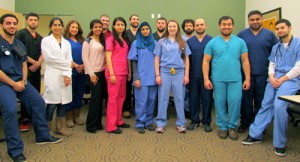

University of Michigan-Dearborn's Global Brigades
“If I were to get sick, living in a village, I’d have to take the bus at least an hour to get to a place where they could treat me,” said Zeidan, a senior studying pre-med at University of Michigan-Dearborn.
Zeidan eventually moved to Dearborn, where he is surrounded by a number of reputable medical centers. But his experience growing up in Lebanon with limited access to medical treatment resonated with him.
It’s what inspired Zeidan to organize a trip to Honduras this summer, where he and about 20 UM-Dearborn students will treat local residents suffering from medical and dental ailments.
“Healing people is universal,” said Zeidan, who plans to enroll in medical school after graduation. “We can really make a difference in a lot of people’s lives over there.”
Their trip is part of Global Brigades, the world’s largest student-led movement for global health and sustainable development. UM-Dearborn is one of more than 200 campuses worldwide with a Global Brigades chapter.
The organization’s mission is to deliver medical and dental care to international rural communities with limited access to healthcare. Enter Honduras.
There, UM-Dearborn students will receive firsthand clinical experience, while assisting physicians, dentists, nurses and pharmacists from Honduras and southeast Michigan.
“I’m excited to get clinical experience, like checking vitals and just talking to the patients there,” said Usha Kadiyala, a junior biochemistry major who helped organize the campus’ Global Brigades chapter. “A lot of our pre-med students volunteer at hospitals, but they don’t get direct-care experience. This trip offers that, plus it’s an international experience, so we get to learn about the health care differences between our country and theirs.”
The students’ journey is slated to begin May 18, as UM-Dearborn will team up with UM-Ann Arbor for a joint health brigade. During their seven-day trip, students could treat upwards of 3,000 Hondurans.
“Everyone has a purpose in life,” Zeidan said. “Mine is to help make a difference, and that’s exactly what we plan on doing in Honduras.”
The trip, however, comes with its share of expenses. Each student is expected to pay $1,500 to cover transportation, lodging and food. Additional funding is necessary to cover the cost of medication, supplies and hygienic products, like toothbrushes and bandages, which will be disbursed to Hondurans.
In an effort to reduce students’ financial burden when traveling to Honduras, Dean Martin Hershock plans to allocate money from the College of Arts, Sciences, and Letters’ Annual Fund.
“The eagerness of these students to engage in this program speaks volumes about their dedication to their chosen course of study, but also about the reasons why they have chosen this particular career path,” Hershock said. “I’m incredibly proud of what this group of students has been able to pull together in a very short time, and of the way that they embody our campus commitment to engagement. This is exactly the sort of activity that our alumni enthusiastically support–activity that transforms both the individual student, as well as the world in which we live.”
To donate to the students’ trip.





